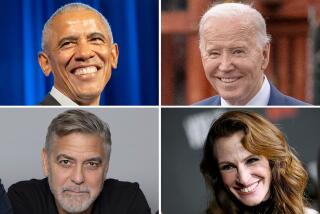GOP Funds Probe Targets Gore Run for Presidency
- Share via
WASHINGTON — When House and Senate committees conduct hearings on campaign finance abuses later this year, their main focus will be the Clinton presidential campaign of 1996. But Republican congressional leaders also have another target in mind: the Gore presidential campaign of 2000.
Vice President Al Gore, who hopes to succeed his boss as president, raised millions of dollars in “soft money” for the Democratic National Committee last year--an effort that put him together with some questionable donors, whose money has since been returned by the party, and with some of those who solicited the funds.
Gore was embarrassed last year when it was revealed that he appeared at a fund-raising lunch at the Hsi Lai Buddhist Temple in Hacienda Heights--an event that the Democrats acknowledged should not have occurred at a place of worship and that also raised some questionable donations.
Now the vice president and his supporters are bracing for more congressional scrutiny of that incident and others from two years of determined fund-raising on his party’s behalf:
* Gore presided over 23 of the now-famous White House “coffees” that were staged for big donors and other supporters; his wife, Tipper Gore, held at least four similar events at the vice president’s government-owned residence. Among the guests at Gore’s coffees in his office in the Old Executive Office Building in the White House complex: Roger Tamraz, a fugitive Lebanese businessman sought by Interpol on embezzlement charges stemming from the collapse of a Beirut bank he once chaired.
* A star attraction at DNC fundraisers, Gore met with or spoke to some of the foreign-linked donors whose enormous contributions were subsequently returned, including Thai businesswoman Pauline Kanchanalak and Indonesian citizens Arief and Soraya Wiriadinata. The vice president has known John Huang, the fund-raiser who brought in many of the troublesome Asian contributions, since 1989, when Gore--then a U.S. senator--met him in Taiwan.
* The vice president wrote a warm letter on White House stationery praising a venture of the Lippo Group, the Indonesian firm that once employed Huang and that has been at the center of the fund-raising storm. The Gore supporter who requested the letter said it would help cement a Lippo joint venture with his American firm in China. A Gore spokeswoman described the letter as routine.
Aides to the Senate and House panels investigating the campaign finance issue said they plan to look into Gore’s role--and acknowledged that the inquiry could become an early skirmish in the next presidential campaign.
Sen. Fred Thompson (R-Tenn.), chairman of the Senate Government Operations Committee--and a potential GOP presidential candidate--already has fired a shot across the vice president’s bow. Subpoenas issued by Thompson’s committee to dozens of potential witnesses two weeks ago demanded documents related to the Hsi Lai Temple event, at least one of Gore’s coffees and Gore’s letter praising the Lippo venture.
Gore is keeping a deliberately low profile on the issue, speaking out in favor of the campaign finance reforms President Clinton has endorsed but avoiding questions about his own role. He declined to be interviewed for this article.
His spokeswoman, Lorraine Voles, said: “The vice president attended a number of fund-raisers that were sponsored by the DNC, and he relied on the DNC to [check] participants in those fund-raisers. Obviously, there have been a number of problems. The president and the vice president have asked the DNC to tighten up its procedures.”
Voles said Gore views the issue as “a distraction from the real work he and the president are doing.”
“He knows that members of the opposition will use these events to exploit the issue,” she said. “When someone questions your reputation, that’s painful. But he has a very solid reputation in this town and it’s intact. So he’s just going to continue working in the best interests of the American people.”
“Gore’s got a pretty thick shield in terms of integrity,” said Carter Eskew, a Democratic media consultant who has worked closely with the vice president. “People think he’s an honest guy.”
Indeed, a recent NBC News-Wall Street Journal poll found that 45% of respondents rated Gore’s ethical standards as “high” or “very high.” On the same question, Clinton scored 31%.
But some Gore supporters worry that the campaign finance issue could puncture the vice president’s armor.
“The damage that’s been done to him is that you have someone who was so pristine . . . that any allegation is in stark relief to the view that people hold of him,” one said.
“Obviously Fred Thompson has a major goal and a minor goal,” said another. “His major goal is to catapult himself into stardom on the national political stage. His minor goal is to destroy the person he may see as his principal opponent in 2000, Al Gore.”
Gore’s career in politics--he was elected to the House in 1975 at the age of 27--embodies the dilemma of many reform-minded Democrats: He has supported changing the campaign finance system even as he raises millions of dollars under the rules he denounces.
“In Congress, he was an aggressive fund-raiser--but he was also very good on the campaign finance issue,” said Ann McBride, president of Common Cause, an independent lobbying group that has focused on campaign reform.
Between 1983 and 1992, Gore raised nearly $2 million from political action committees, including substantial sums from those representing labor unions, communications and insurance firms and pro-Israel organizations.
Gore met Huang in 1989, when he joined a delegation of Asian American Democratic fund-raisers on a trip to Taiwan. Huang donated $1,000 to Gore’s Senate reelection campaign later that year. Another fund-raiser who helped orchestrate the tour, Los Angeles entrepreneur Maria Hsia, donated $2,000.
As Democratic strategists looked toward the 1996 election, they counted on the vice president to play a major role in their fund-raising efforts.
“He was very involved in the fund-raising,” Harold M. Ickes, a former White House deputy chief of staff, said in a recent interview. “Take a look at his schedule.”
At one White House meeting, Democratic Finance Chairman Marvin Rosen said the party could reach its ambitious $125-million “soft money” fund-raising goal only if it “had the president’s time and the vice president’s time,” a participant recalled.
An internal DNC document dated January 1996 proposed 49 events for Gore around the country and noted that in addition “we request two dinners in [Washington] D.C. each month.”
Democratic records show that Gore appeared at 40 fund-raisers for the party, ranging from intimate dinners with fewer than 10 donors to large gatherings with 1,300. Some contributors could rub shoulders with the vice president for as little as $1,000; others paid $12,500 for a ticket.
But the DNC’s official list is incomplete. It does not include the April 29, 1996, lunch at Hsi Lai Temple, which raised $140,000, for example.
The temple event was sponsored by the party’s Asian Pacific American Leadership Council. Members contributed at least $2,500 each to join the group. Gore had met with the council’s members at least once before, at a fund-raising breakfast in Washington.
The two principal organizers of the temple visit were familiar faces to Gore as Democratic fund-raisers: Huang and Hsia.
When the temple event became public knowledge, Gore initially said he believed it was merely “a community event.” But later, after documents surfaced showing that the Democratic Party had briefed Gore aides about it in advance, the vice president’s spokeswoman acknowledged: “He knew it was a finance-related event.”
Supporters and foes alike agree that Gore’s initial failure to be more forthcoming may be as damaging as his attendance.
Gore has also hosted Democratic events at the vice president’s official residence, a turn-of-the-century wood-frame mansion atop a hill on Washington’s Massachusetts Avenue.
The Times requested records of those events; the White House and Gore’s office have released no record of the events, other than descriptions of a handful of coffees hosted by Tipper Gore.
Republican congressional investigators also are focusing on a 1994 episode in which Gore sent a letter to one of the top executives of Lippo--the Indonesian conglomerate that then employed Huang--supporting a joint venture with an American firm.
Gore’s letter, to Lippo’s James T. Riady, congratulated the firm on its alliance with the Protective Life Insurance Co. to sell insurance in China.
The letter was requested by William B. Blount, then chairman of the Alabama Democratic Party, who told Gore it “would greatly help to solidify” Protective Life’s relationship with the Riadys. Blount had served on the U.S. company’s board.
Gore’s response “was your basic form letter,” Voles said.
Blount also asked for introductions to officials at the State Department, the Commerce Department and the U.S. Trade Representative’s office.
“That was never done,” Voles said.
Even as he played the fund-raising game through his career, Gore sought to change the rules. In 1986 and again in 1987, he introduced a bill to provide partial public financing for Senate campaigns. The measure went nowhere.
These days, Gore is speaking out again in favor of campaign finance reform. Along with Clinton, he has endorsed a bill introduced by Sen. John McCain (R-Ariz.) and Sen. Russell D. Feingold (D-Wis.) that would end virtually all unregulated and unlimited “soft money” fund-raising by the political parties.
Last month, however, when Clinton, Gore and other Democratic leaders debated what unilateral action the party could take to improve its image, they shrank from a proposal to impose a total ban on “soft money” at the DNC. Instead, they opted for a yearly ceiling of $100,000 per donor.
Officials involved gave conflicting accounts of where Gore stood on the idea. Voles said: “He was for a total ban.” But three others said Gore did not offer any backing for the proposal, which died for lack of support. “Gore killed it,” said one. Others noted that most of Clinton’s advisors opposed the idea.
As the fund-raising controversy continues to grow, it seems that Thompson’s Senate hearings could turn into an intriguing dress rehearsal for the 2000 presidential campaign.
The Tennessee Republican is already mentioned by many fellow Republicans as a possible candidate, and the nationally televised hearings loom as a chance to burnish his image.
Thompson and Gore, the most powerful members of their respective parties in Tennessee, already have a notably chilly relationship. Last year, Thompson objected to the reappointment of a Gore fund-raiser, Johnny Hayes, to the board of the Tennessee Valley Authority.
Gore can be grateful for at least one thing: He is undergoing his trial by fire on the issue three years before the next presidential campaign and has plenty of time to recover any ground he might lose.
“Any incumbent vice president rises or falls on the reputation of the administration he serves,” noted Mark Siegel, a longtime Democratic strategist. “If the economy turns down, if the unexpected happens, the whole picture may change. It’s way too early to predict the impact this might have in 2000.”
Times staff writer Glenn F. Bunting contributed to this story.
* CHARGES DENIED: Ex-envoy to Taiwan denies soliciting campaign funds. A12
More to Read
Get the L.A. Times Politics newsletter
Deeply reported insights into legislation, politics and policy from Sacramento, Washington and beyond. In your inbox twice per week.
You may occasionally receive promotional content from the Los Angeles Times.











